How to Optimize ChatGPT SEO for Physicians and Dental Practices
Every day, practice managers of dental and medical practices contact PatientGain and ask us: How doctors can leverage ChatGPT for SEO?
The practice managers are really asking us that if a potential patient is using apps like ChatGpt, Gemini or others, and if they search for “best back pain doctors in Sugarland TX” how can the app like ChatGpt, Gemini can mention their practice’s name?
See example below – A patient is searching on Google – but Gemini AI is responding with AI suggestions and answers.
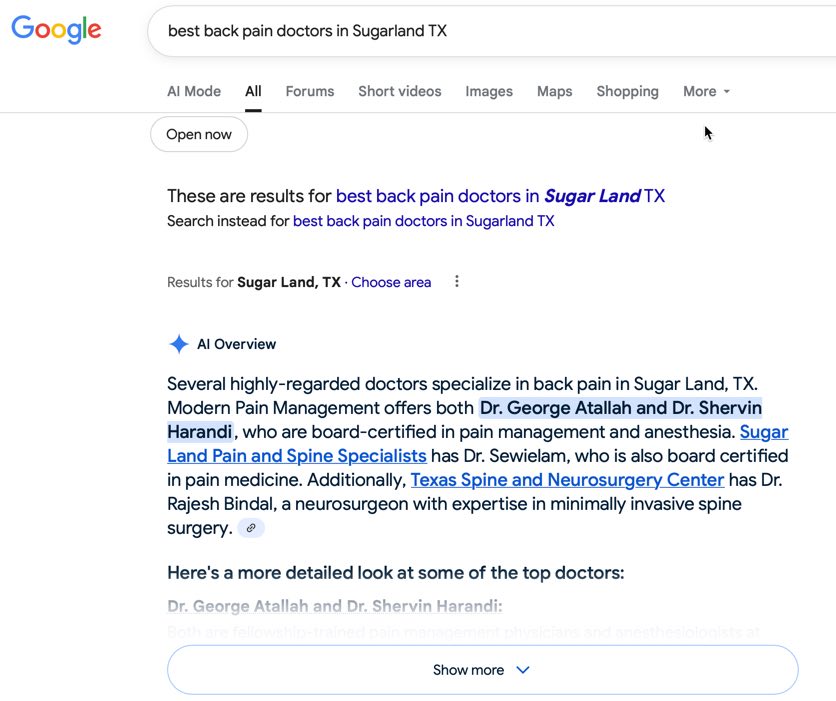
Optimizing ChatGPT SEO for physicians and dental practices
Optimizing ChatGPT SEO for physicians and dental practices requires a slightly different approach than traditional SEO, as ChatGPT and other AI-powered platforms do not rank websites based on keyword density or backlinks like Google. Instead, they rely on understanding context, relevance, and structured data to provide accurate answers. To understand the role of AI in how patients find them. However, the phrase “ChatGPT SEO” is a common misunderstanding that needs clarification first. The direct answer is: You cannot perform traditional SEO directly for ChatGPT. The strategy is not about optimizing for ChatGPT, but about building such a dominant and authoritative online presence that you become a primary source of information for all AI models, including Google’s powerful AI Overviews, which patients are using right now.
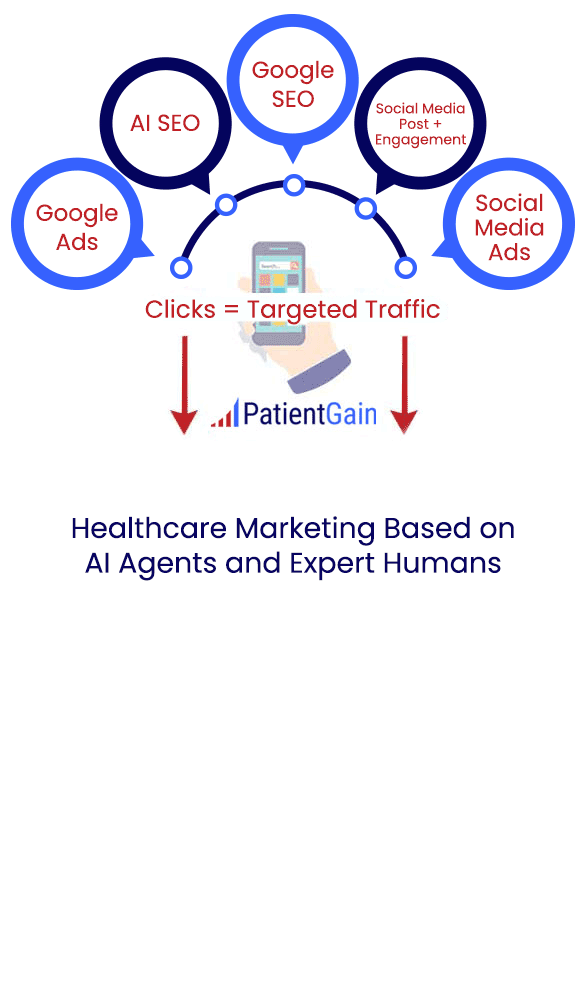
The Key Distinction: ChatGPT vs. Google Search
- Google Search is a live information retrieval system. It constantly crawls the web to find, index, and rank the most relevant and authoritative answers to a user’s query. SEO works here because you can directly influence the source material.
- ChatGPT is a Large Language Model (LLM) that was trained on a massive but static dataset of information from the internet at a point in the past. It does not “browse” the web in real-time to answer you. It generates responses based on the patterns it learned from that training data.
Why This Matters for Your Practice: You cannot get ChatGPT to “mention” your practice on command. Furthermore, relying on it is risky, as it can “hallucinate” and provide potential patients with incorrect information (e.g., wrong phone numbers, services you don’t offer, or outdated hours). The real, effective strategy is to focus on mastering the digital ecosystem that patients use today and that AI models use for their training data.
Example 1: ChatGpt interaction: A patient asks for “best invisalign dentists in toledo oh”. Based on the current information available as of 2025, and PatientGain’s assessment, the ChatGpt app is trying to mimic a rudimentary search engine. It is reading the reviews sites (specifically Yelp) and very likely some data from Bing search engine, and then also reading the content of websites in Toledo OH.
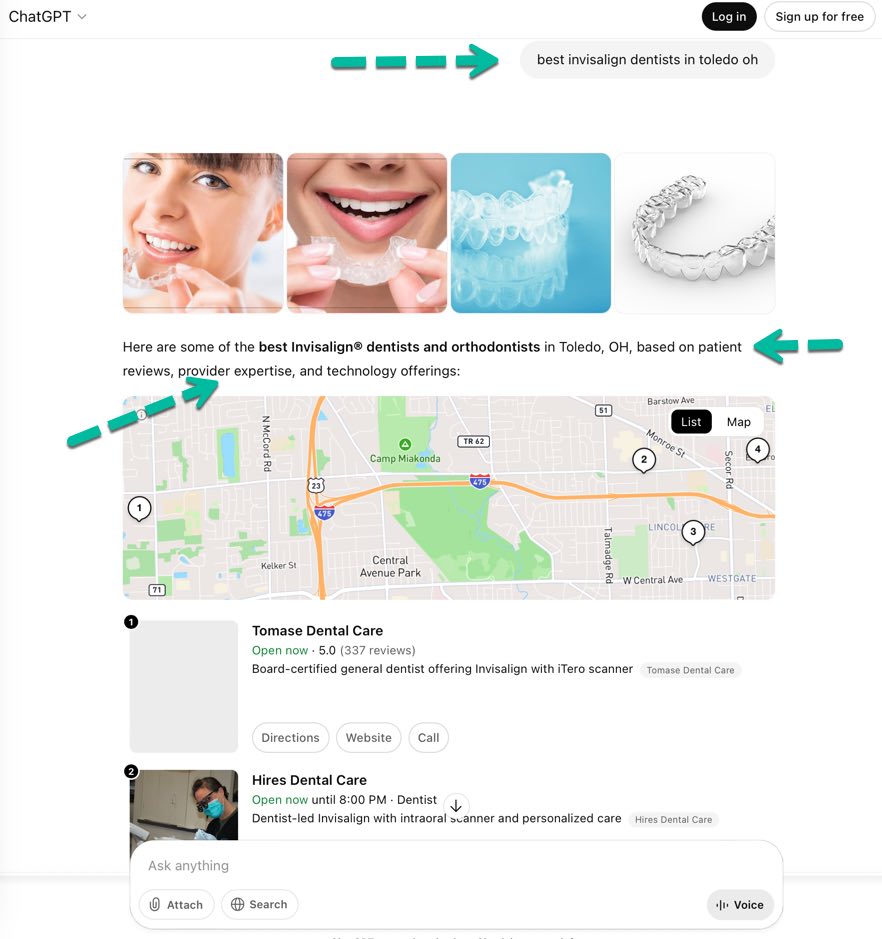
Example 2: ChatGpt interaction: Next, the ChatGpt is displaying “Top-rated Providers”. Again results are coming from Yelp, among other sites.
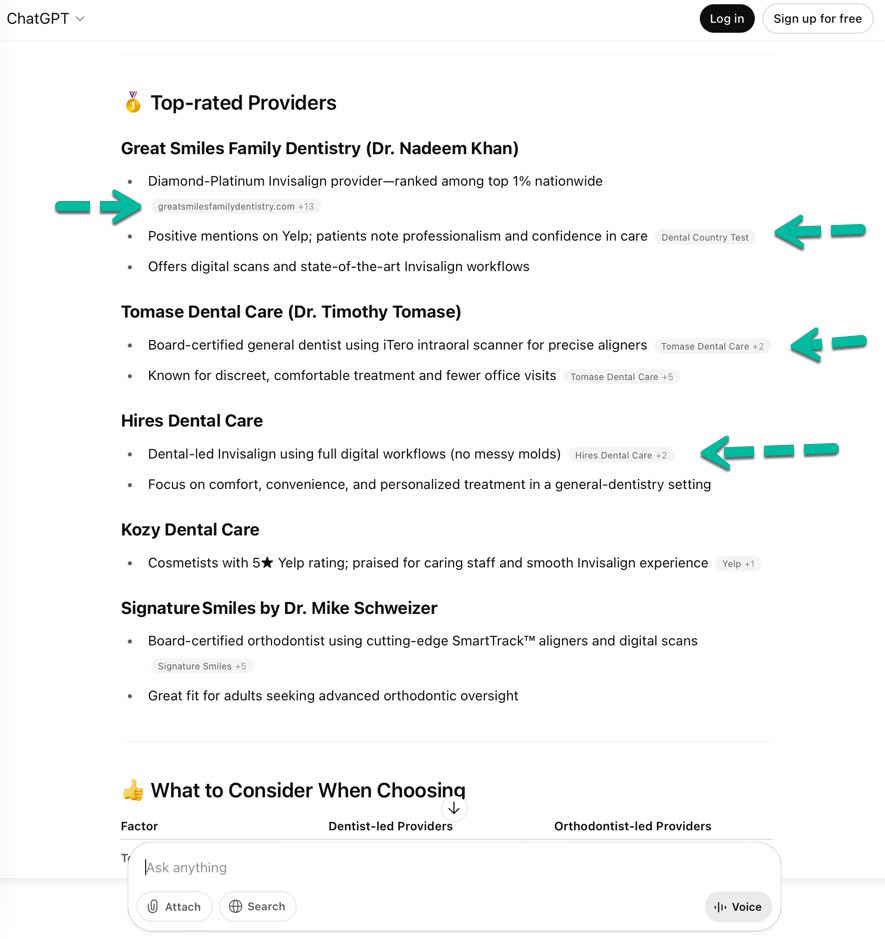
Example 3: ChatGpt interaction: Next, the ChatGpt is guiding the patient to schedule a complimentary consultation. However, it is alerting the user that results are not likely to be accurate and user should check location information (meaning go to Google maps) and finally that ChatGpt can make mistakes. It is also providing links to sources.
Conclusion: ChatGpt is trying to become a Google search engine. However it is in very early stage.
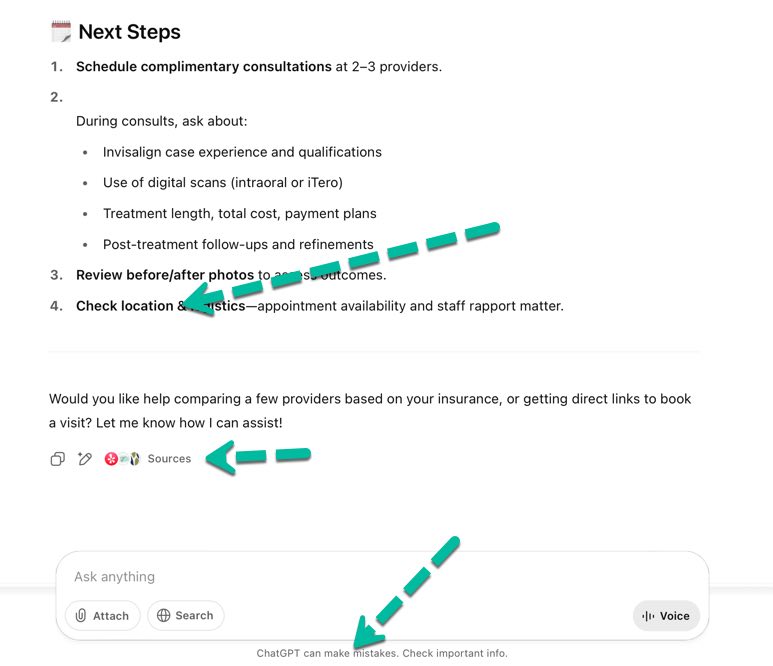
Example 4: Google search interaction – Since Google search is the gold standard in the search engines, you can clearly see the difference in the results. Based on PatientGain’s experience, Google search is the most accurate search engine. Information presented is much more relevant to the user’s intent.
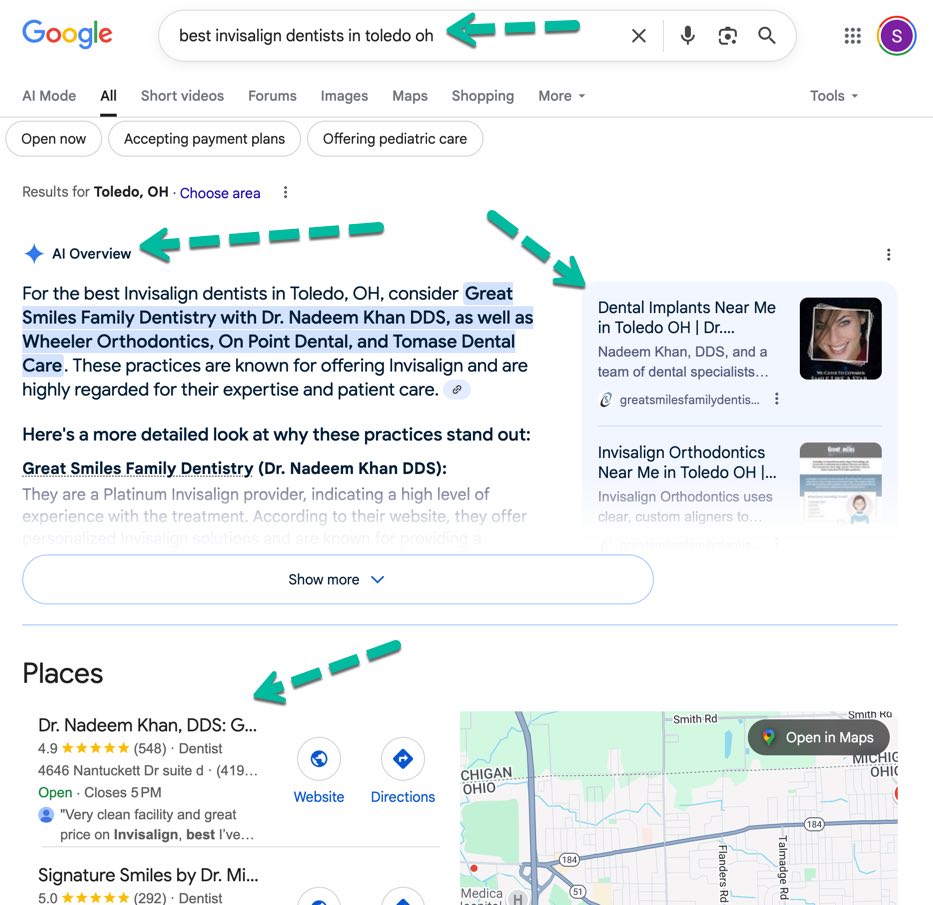
How to optimize ChatGPT SEO for your medical or dental practice
To optimize ChatGPT SEO for your medical or dental practice, it is crucial to ensure your website is structured, informative, and easily understandable by AI systems. The goal is to increase the chances of your practice being referenced in AI-driven responses when potential patients ask about your services. Below is an expanded guide, with real-life examples of how you can implement each optimization strategy.
1. Implement Structured Data (Schema Markup)
Structured data (schema markup) is a way to provide context about your practice to AI systems like ChatGPT, helping them understand and accurately reference your services.
Example:
- If you are a pediatric dentist, using DentalService schema could help AI systems identify your specialty, location, and available services.
Code Snippet Example:
jsonCopy{
"@context": "https://schema.org",
"@type": "Dentist",
"name": "Dr. John Doe Pediatric Dentistry",
"address": {
"@type": "PostalAddress",
"streetAddress": "123 Main St",
"addressLocality": "Your City",
"addressRegion": "Your State",
"postalCode": "12345",
"addressCountry": "USA"
},
"serviceType": "Pediatric Dentistry",
"priceRange": "$$"
}
By implementing this schema, ChatGPT can easily reference your practice when a user asks about pediatric dental services in your city.
2. Create Authoritative and Conversational Content
AI like ChatGPT understands and responds better to conversational queries. You need to create content that answers real patient questions and does so in a clear and concise way, as users tend to ask open-ended and specific questions.
Example:
- FAQ Section: Having an FAQ section where you answer questions like “What is Invisalign?”, “What should I expect during a root canal?” will improve your chances of appearing in a response.
FAQ Example (for a dental practice):
Q: How long does a dental implant procedure take?
A: The dental implant procedure usually takes about 1-2 hours. Afterward, you may experience some discomfort as the implant heals, but the overall recovery time typically takes several months.
Such content in a natural, conversational tone helps ChatGPT understand the context and structure of the answer and improves its chances of referencing your practice.
3. Optimize for Local SEO
Most healthcare queries are location-based, so optimizing for local SEO is essential. You should use local keywords and make sure your practice’s location, contact details, and service offerings are clear and up-to-date.
Example:
- Local Keywords: If you are a cosmetic dentist in Miami, make sure to include keywords like “Miami cosmetic dentist” and “best dentist in Miami” across your website.
- Google My Business: Ensure your Google My Business profile is complete with the correct address, hours, and services offered. This makes it easier for AI to pull accurate information.
Example: A Miami-based dental clinic could include on their website:
“If you’re looking for cosmetic dentistry in Miami, our clinic offers services like teeth whitening, veneers, and Invisalign.”
This ensures your practice shows up when someone searches “best cosmetic dentist in Miami”, increasing the chances of being referenced by AI like ChatGPT.
4. Leverage PatientGain’s PLATINUM Service for Optimization
PatientGain.com offers a PLATINUM service that integrates several features to enhance your healthcare SEO. Here’s how you can optimize your practice with PatientGain’s tools for ChatGPT SEO:
Example 1:
- AI-Driven Content Marketing: PatientGain helps practices by regularly adding SEO-optimized content to the website, improving patient engagement and search rankings. Example: If your practice offers dental implants, PatientGain might help you create a detailed blog post explaining the implant process, answering common patient questions, and improving content visibility in search engines.
Example 2:
- HIPAA-Compliant Chatbot: The HIPAA-compliant chatbot PatientGain provides allows you to engage patients 24/7 on your website, improving your response times and patient acquisition. Example: A patient might ask, “What is the provider’s qualifications?” The chatbot provides immediate, accurate information, and if the user needs more detailed information, it can book an appointment for a consultation.
Example 3:
- Local SEO Optimization: The PLATINUM service optimizes your website for local SEO, ensuring your practice appears in local searches. Example: If someone types “best family physician in [city]” into Google or ChatGPT, your optimized practice profile gets improved chances of referenced for the query.
5. Optimize for Voice Search
Since ChatGPT interacts using conversational queries, optimizing for voice search can help improve your practice’s chances of being referenced in voice-assisted responses.
Example:
- Use of Long-Tail Keywords: For voice search, users tend to ask questions like “Where can I find a dentist near me?” or “What is the recovery time for wisdom teeth removal?”
- Natural Language: Use question-based phrases throughout your content to match how people typically phrase their queries. For instance, a page for wisdom teeth removal could include a section on “What should I expect during and after wisdom teeth removal?”
Example: A dental practice could structure content with headings like “How long does it take for dental implants to heal?” which will align with conversational voice search queries.
6. Engage in Social Media and Reputation Management
AI platforms like ChatGPT also pull information from social media platforms and patient reviews. Engaging with patients and gathering feedback through reviews is vital for improving your online presence.
Example:
- Patient Reviews: Encourage patients to leave positive reviews on platforms like Google, Healthgrades, and Yelp. ChatGPT often references these reviews in its responses when someone asks about the reputation of a medical practice.
- Active Social Media: Share patient testimonials and service highlights on social media platforms like Instagram, Facebook, and LinkedIn. This content can also help improve your practice’s visibility.
Example: A cosmetic dentist could showcase before-and-after photos on Instagram, driving engagement and providing social proof that can be referenced by ChatGPT when users ask about cosmetic dental services.
Conclusion: Optimizing Your Medical or Dental Practice for ChatGPT SEO
Optimizing your healthcare website for ChatGPT SEO is about ensuring that your content is accurate, engaging, and well-structured. ChatGPT uses AI to process conversational queries, making it crucial for medical and dental practices to provide clear, informative, and authoritative content.
By implementing structured data, creating conversational content, optimizing for local SEO, and leveraging PatientGain’s PLATINUM service for SEO and reputation management, your practice can increase its chances of being featured in AI-driven responses when potential patients ask about your services.
These steps, combined with traditional SEO strategies, will help your practice maximize online visibility, attract new patients, and enhance patient engagement through ChatGPT and AI-powered platforms.

